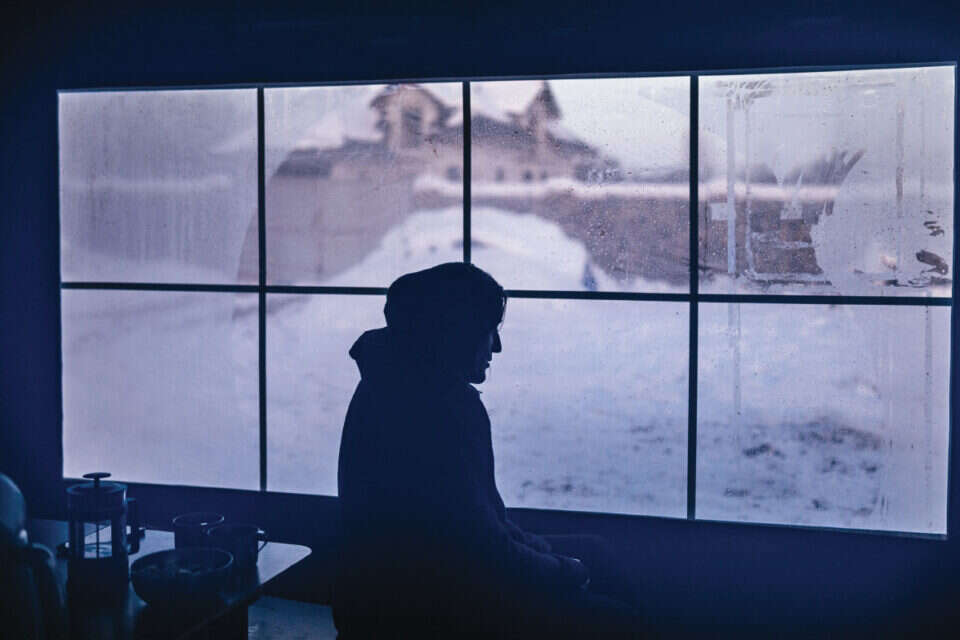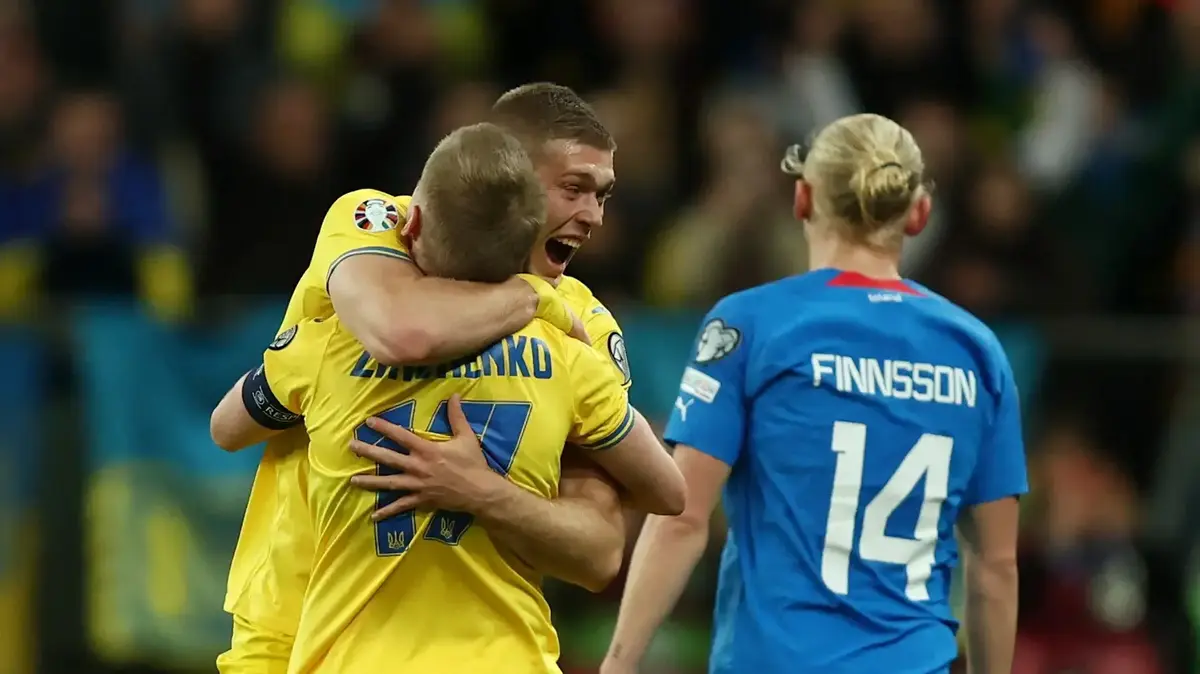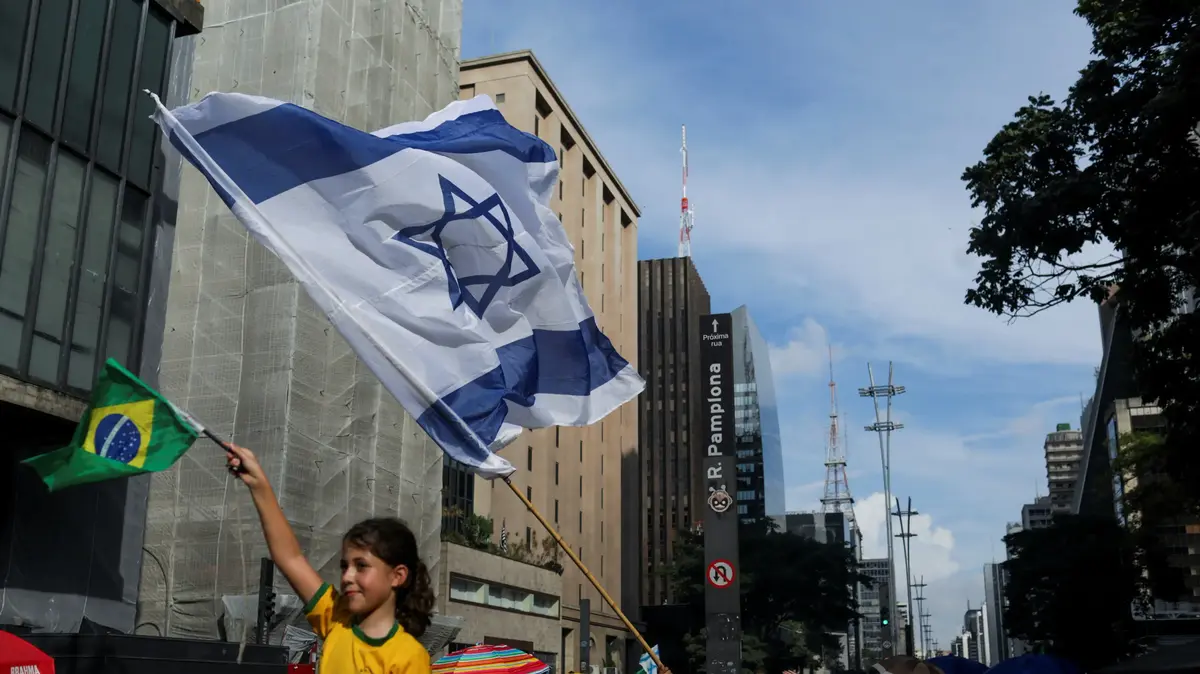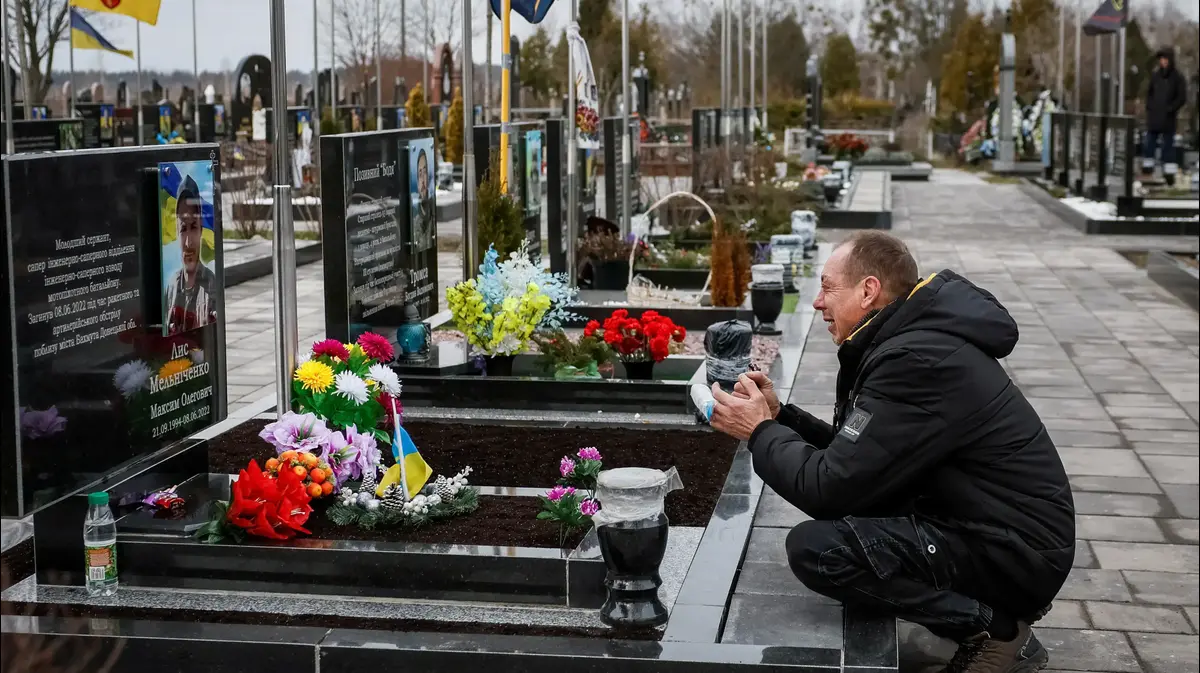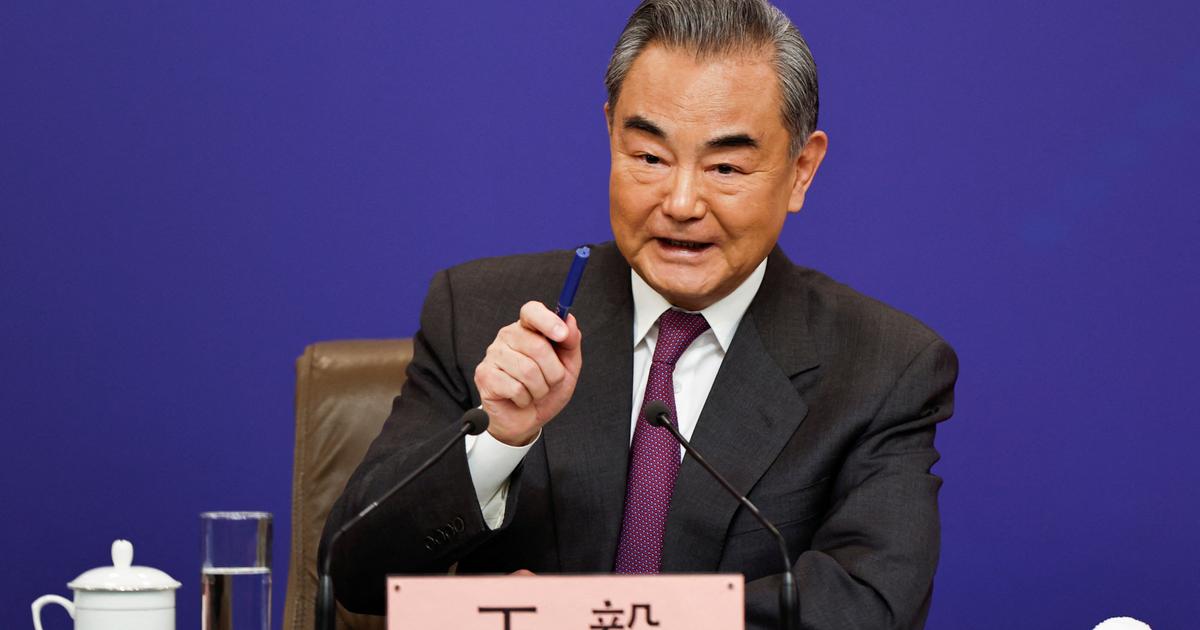Vitaly Klitschko, mayor of Kyiv, was waiting for me at the entrance to his office, on the tenth floor of the city hall. "Hello," he said in Hebrew, and switched to English: "How are you? I must apologize, but I have to go to a meeting that cannot be delayed with military personnel. I'll be back in 45 minutes. Please wait for me. Drink coffee in the meantime."
After 45 minutes he returned, like the muzzle of a cannon.
Before I even started to ask, he fired: "Everything the Russians are telling is a lie. This is not a war, this is a genocide of the Ukrainian people. It is terrorism what they are doing now to Ukraine. They are trying to destroy necessary infrastructure for our city. They want to freeze people. Now The weather is getting colder, winter, the temperature outside is minus 5 degrees, and will soon reach minus 20 and minus 30.
"The winter in Ukraine is quite cold, and at this time they try to damage our critical infrastructures, water infrastructure, electricity. Putin is interested in the territory of Ukraine, only without the Ukrainians, that's his goal. To break our spirit, to bring us into depression. But Putin was wrong, because instead of depression People feel outrage and are ready to fight and defend our homeland."
You used the words "genocide". These are hard words.
"They are trying to eliminate the entire population of our country. This is not fighting against an army, it's all lies. They have murdered many thousands, destroyed entire cities and entire villages. In our city so far 670 buildings have been destroyed, of which 350 are residential buildings. The fighting is not happening here in Kyiv, but People have been killed here by missile attacks, suicide drones.
You in Israel know very well what I'm talking about, and what happens in your country also happens here."
Is Putin a war criminal?
"Yes! He is a criminal."
Darkness in the Victory Monument
Kyiv is different than it is imagined from the outside.
The war is not directly present in it.
The only time I heard an alarm was when we entered the city.
In retrospect, it turned out that this was a false alarm: radars detected a plane that took off from Belarus with hypersonic missiles on it. In Ukraine, they do not take risks in such a case, and all major cities are alerted. The plane continued on its way without being attacked, but in previous cases there had actually been attacks: in Kiev, they say that since the beginning of the war, Russia had launched More than 16 thousand missiles and rockets to the territory of Ukraine.
The sirens are heard all over the city, but the alerts are also transmitted to the residents through a special application that is similar to the "red color" in our country.
When the red color lights up, a warning of an impending attack comes in.
When the color turns green, you can go back to normal.
The citizens also make sure to keep up to date on the Telegram groups, where all the information is transmitted - on behalf of the authorities, and also by media networks from institutions and less institutions.
The behavior during the alarms varies among the citizens.
Those who are in the buildings rush to take shelter.
It is not always easy, because Kyiv is not full of shelters and there are no protected spaces in the houses.
Those who are on the street have nothing to do.
"We keep driving," says the driver who brought us from Lviv to Kyiv.
But even when there are no direct attacks, the war is clearly visible in Kiev.
In the central square, in front of the magnificent monastery named after St. Michael, stand the corpses of Russian armored personnel who were taken as booty in the war.
It looks like a scene from a movie: a charred Russian weapon in the center of the city, with Ukrainian flags on it, and everything in the snow, with the center of the Orthodox Church in the background.
Several children who were brave enough to face the intense cold that prevailed last weekend in Kiev (minus 3 during the day, minus 6 at night) climbed the armored cars. I asked the father of one of them what he told the boy. "That we are winning," he replied.
Victory is the key word in Ukraine.
When the war started, no one believed they had a chance.
All the experts and commentators estimated that within a few days the business would be over and the Russian army would march on Kiev.
The Ukrainians say that the Russians even held a victory parade on the main avenue of the city, including performances by the best rock and pop artists from Moscow.
They were not far from achieving their goal;
At the western entrance to the city there are quite a few buildings that are still destroyed by the fighting, and in the towns of Bucha and Irpin - well-to-do suburbs of Kyiv - some of the worst atrocities of this war took place.
Since then, a lot of water has flowed in the Dnieper.
Ukraine managed to repel the Russian army not only from the Kyiv sector, but also from many other districts.
Military-wise, she seems to have the upper hand at the moment, but civilly - her situation is not easy.
"The situation in Ukraine is not good," says Michael Brodsky, Israel's ambassador to Ukraine who now operates from Warsaw.
"The Russians are damaging critical infrastructures - electricity, water, gas. This causes prolonged power outages, sometimes for days, in severe cold. Those who have the option, leave the city. Those who don't, are in trouble."
The electricity crisis is evident in every corner.
The escalators in shopping malls and subway stations are disabled, to save electricity.
The Victory Monument, the pride of the city, is completely dark in the evening.
The street lights also work partially.
Until recently they were completely blacked out, but after there was a sixfold increase in the number of traffic accidents, it was decided to renew them as little as possible.
"We save on electricity here as much as possible," says Lilia, a young local, Jewish woman who works at the Israeli embassy.
"Our best friend is the power bank. I charge it first, and only then the phone. People walk in the dark on the street with their cell phone flashlight. At night, you have to sleep with your clothes on, because you never know when the electricity will go out."
Some institutions (hospitals, hotels, shopping malls, government offices) have generators, but most businesses have to survive on only a little electricity.
Some of the restaurants and cafes close when it gets dark - in the winter it happens around four o'clock - and some stay open, and sometimes work by candlelight.
In any case, the city goes into curfew at 11 at night, which means that you have to finish much earlier in order to have time to tidy up and clean, and allow the workers to get home on time.
Every day at 10:00 p.m., citizens receive a message on their cell phones that they have one hour left until curfew begins;
The sale of alcohol stops at seven in the evening, so that people do not get drunk and can arrive before the curfew.
"Don't even think about breaking the curfew," a local friend advised me, "They have no sense of humor. It could end in a fine, and even arrest."
The curfew began for operational reasons during the war on Kyiv, and is maintained today for a completely different motive: to generate identification of the entire country with the bloody front.
This is especially noticeable in Lviv, on the Polish border, which, except for its busy border with Europe, is completely quiet.
Even in Lviv the curfew continues (midnight), and to those watching from the side there is something impressive about it - a whole country that avoids the feeling that there are those who pay a heavy price and those who continue to enjoy a normal life, and makes sure to behave as if it is all one cohesive front.
disconnecting from Moscow
Getting to Ukraine is complicated.
It is possible from the land borders in Poland, Moldova, Romania and Slovakia.
The most popular route goes through Poland, which also hosts about three million Ukrainian refugees, as well as hundreds of Jews who are waiting there for the procedure of checking their Jewishness, before immigrating to Israel.
The journey between Warsaw and the border takes about four hours, and at the border itself there is a long line of private cars and trucks, in two separate lines, waiting to cross the border to the east.
The line for private vehicles is much shorter, while trucks are sometimes required to wait two or even three days before they continue on their way.
Chemical toilets are placed on the side of the road;
The drivers only get out to smoke, and flee the cold back to their cars.
Most of the time they stand with the engines idle, and from time to time the trucks and vehicles are started to warm up a little - and idle again.
We traveled by car with a Ukrainian driver, who holds a permit to cross the border.
This is not an obvious matter: men aged 18-60 are not allowed to leave Ukraine, and exceptions are only possible if the driver has three children or a special permit.
Crossing the border is the trickiest part of the journey: on the way out it took us two and a half hours to cross it, and on the way back - more than five and a half hours.
It's a matter of luck, timing and the nature of the tests.
On the way west, to Poland, the tests are much tougher;
On the Ukrainian side, they check the vehicle to make sure that neither people nor money are smuggled in it (it is forbidden to take out of Ukraine more than ten thousand dollars per person), and upon entering Poland, they check to make sure that there is no illegal smuggling to Europe.
The inspectors on both sides of the border have no sense of humor: the people in this part of Europe are tough, certainly in times of war.
The road from the border to Lviv takes about an hour.
It is not possible to continue on the same day to Kyiv, because the journey between the cities takes another 7-8 hours, which means entering the curfew hours.
Therefore, the route continues only the next day, in other words - it takes a day and a half to get from Israel to Kiev (and the same amount of time to return home from there).
The roads in Ukraine are relatively comfortable, partly single-track and multi-track as you get closer to Kyiv.
Traffic is busy in the cities, despite the war, although the drivers are courteous in most cases and hardly ever blow their horns.
Some of the roads also show the signs of the war, and the marks of the chains of the Russian and Ukrainian tanks that moved on them in the beginning are still visible.
Cellular reception is good in most cases, but it is also subject to disruptions in the electricity supply.
In parts of the road it disappears completely, then returns, and disappears again.
Every few tens of kilometers there is a gas station, with a small inn and toilets.
The prices are ridiculous: a bottle of Coke, iced tea, Red Bull (for the driver), two energy bars and a bag of potato chips together cost us 12 shekels.
The driver laughs that the price is now high, because of the war.
"Until a year ago it was 25 percent less."
The prices in Kiev are also low, certainly relative to Israel, and despite this most of the shops are empty.
Some of the international chains closed their branches here at the beginning of the war, and others are struggling to survive.
The war also shows its signs in the most traditional matters: the Christmas market, for example, is spread out every year on the long sidewalk that leads from the St. Michael's Monastery to the St. Sophia Cathedral.
This year this market will be very limited, if at all;
The issue is still debating between the desire to broadcast a routine and allow the residents to breathe, and the understandable concern for their safety.
The streets are almost empty of people even in the city center.
The extreme cold is a major reason, but so is the war.
Unlike in the past, now there are almost no street vendors in Kyiv.
On the stairs that lead to the view of the Dnieper, behind the monastery, we meet a local woman who is trying to sell dolls that her mother makes in a distant village.
A few meters away, at the entrance to the monastery, sits an elderly beggar trying to warm herself with a cup of tea.
But despite the difficulties, Ukraine is patriotic and determined.
This is evident in everything: everyone insists on speaking Ukrainian and not Russian;
Christmas will be celebrated this year for the first time on December 25 as in the entire Christian world, and not at the beginning of January as in Russia;
Street names are changing - Krasnodarsk Street was changed to Golda Meir Street, and now they intend to change the name of Moskva Street as well (there is a heated debate in the city about whether to change the name of Pushkin Street as well).
All this is happening as part of the general message that is being marketed from Kyiv to Moscow, and the main thing is: "No electricity, no water, no gas - but also without you."
A war on values
Mayor Klitschko is a well-known and very popular figure in Ukraine.
Former three-time heavyweight boxing world champion, an achievement equal to that of Muhammad Ali, Lennox Lewis and Evander Holyfield.
He has served as the mayor of Kyiv since 2014, and as the head of the Solidarity Party since 2015.
Before the war he was considered a leading candidate for the presidency of Ukraine, but now the issue is not on the agenda - mainly in light of the high popularity of the president, Volodymyr Zelensky.
Both, by the way, have Jewish roots: Klitschko's father was Jewish, and in his office there is a menorah in the center of the large bookcase (with an icon next to it).
"I got it from the chief rabbi here," he says.
Klitschko was interviewed on the occasion of the "Money Expo" conference of the local government center, which was held this week in Tel Aviv.
"This is a huge challenge for us," he admitted, "we are fighting for our survival, we need political and economic support and humanitarian aid, we need generators because there is no electricity, we also need defensive weapons, because we are defending our homeland and our city. Ukraine has always been a peaceful country , and we didn't attack anyone. But now we are forced to defend our territory and our sovereignty.
"Our neutral status in Europe was a mistake."
Klitschko with the mayor of Berlin, Franziska Giphy, photo: AFP
"The reason for this senseless war lies in the fact that we, the Ukrainians, want a modern, democratic and European country. To be part of the family of the European continent. And our desire is not acceptable to Putin, who wants to build the Russian empire, and Ukraine is a very large part of his vision. The war is about The values: We do not want to live in an autocracy where there are no human rights, freedom of the press and democratic values. We are fighting for the future of our children."
Do you want to be part of the European Union, of NATO?
"Of course we want to belong to the European Union, and we see now how much the neutral status given to Ukraine was a bitter mistake.
Ukraine was the third country in the world in the amount of nuclear weapons it had.
We gave it up as a gesture of goodwill, and for a guarantee that our sovereignty and territorial integrity would be preserved.
That was a big mistake."
What do you expect to receive from Israel?
"Israel is an excellent example for Ukraine. A small country that has been fighting aggressors for so many years, and successfully defends its citizens and its territory. We need Israel's support, technology, knowledge and defensive weapons."
The aid that Ukraine receives allows it to last.
It is about military and intelligence assistance that helped it repel the Russian attack and move to its own attack, and economic and humanitarian aid.
In the West, the cost of rebuilding Ukraine is estimated at a trillion dollars, and in a process that will last for years once the war ends.
The attitude towards Israel is ambivalent.
On the one hand, deep appreciation, on the other - open criticism of insufficient aid.
Ambassador Brodsky has been interviewed dozens of times since the outbreak of the war, and Israel has marketed in every way the aid it has given - mainly medical (from medicines and equipment, to treating the wounded and evacuating children) and generators - and will also hold an innovation conference in Warsaw in the middle of the month under the unofficial title "How to turn Ukraine into Israel".
"Be active for us"
Before the war this was also the direction.
Ukraine has become a base for many high-tech companies, which established their development centers there.
This established a considerable middle class in the country, which until then had a thin layer of oligarchs and a thick layer of the lower class.
Since the outbreak of the war, most of these centers have been transferred to other countries, and some of the workers have also left.
This happened at the same time as the departure of many of Ukraine's Jews - about 14 thousand - although the vast majority remained in the country.
"This is an organized community, with about 200-150 thousand people," says Brodsky, "They receive assistance from many sources, and their general condition is better than the local population. There are even claims that the community grew during the war, because many joined it to receive assistance."
preoccupied with survival.
Street vendor, photo: AFP
Ukraine expects to receive weapons and financial credit from Israel, as well as for Israel to impose sanctions on Russia.
Israel has avoided this so far (the credit matter has not yet been decided), although Benjamin Netanyahu stated on the eve of the elections that he would consider changing Israeli policy.
One of the most effective mediators between the parties in this context is precisely Iran, which provides Russia with drones that are used to attack the cities in Ukraine. "Ukraine considers Iran an enemy country, and is considering severing relations with it," says Brodsky. "They hope that this will make us help them more."
Klitschko describes these attacks as "terror".
He says that we, the Israelis, are supposed to understand better than anyone what the residents of his city are going through.
"We are in one of the largest cities in Eastern Europe and are being attacked by missiles and suicide drones.
Our historic center was attacked.
The Russians are killing innocent civilians.
We have to fight for our dream, our future, our country and our children."
What is the state of the city at the moment?
"We have close to 300,000 refugees from other regions in Ukraine, because the best services are in Kyiv and we are more protected here, and people feel safer being here. The personal safety of the residents is our top priority. We are fighting to save human lives and enable a normal life As much as possible throughout the city."
Part of the communication with the residents is carried out through innovative technologies, which made Kyiv a "smart city" even before the war.
"This is a project that started with Israeli cooperation, after I visited Tel Aviv in 2015 and saw that it works great there. We are investing a lot of money and energy to promote the city, even in the current period."
And yet, Klitschko makes it clear that without international support it will be difficult for Kyiv and Ukraine to survive.
"We need support from every part of the world. It's a big challenge, but I'm more than confident that we'll meet it. I talk to the people, I'm proud to be Ukrainian, I see the great spirit and the mighty will in every Ukrainian, and I'm sure we'll never give up. We'll stand firm for The principles of freedom and democracy, and we will protect our home and our future."
Defense of Ukraine is defense of Europe and the whole world?
"Definitely. Many thought that Putin would be satisfied with the annexation of Crimea, and did not realize that he wanted all of Ukraine. He is a sort of collector of property, former Soviet property, and mentions that the Baltic states are also property of the USSR, as well as Poland, the Czech Republic, and Slovakia.
I told the Germans not to forget that part of their country used to be Soviet property, and the Russians would go as far as they would let them.
This is why we are not only fighting for our home, and this is why European countries should help us, because we are also fighting for them."
Klitschko says it would be a mistake if Israel looked at this war from the sidelines, as if it did not concern them.
"This war can reach anywhere in Europe and the world. Let's not forget, Ukraine has five nuclear reactors. A fire broke out in one of them a few weeks ago. An explosion in one of these reactors would be a greater disaster than Chernobyl. In that case, this war will reach each of us.
"Please be active for Ukraine. Peace in Ukraine, which is one of the largest countries in Europe, means stability for the entire region and the entire world, so we must do everything to stop this senseless war."
were we wrong
We will fix it!
If you found an error in the article, we would appreciate it if you shared it with us

